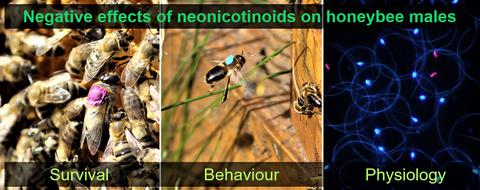当前位置:
X-MOL 学术
›
J. Appl. Ecol.
›
论文详情
Our official English website, www.x-mol.net, welcomes your
feedback! (Note: you will need to create a separate account there.)
Negative effects of neonicotinoids on male honeybee survival, behaviour and physiology in the field
Journal of Applied Ecology ( IF 5.0 ) Pub Date : 2021-08-19 , DOI: 10.1111/1365-2664.14000 Lars Straub 1, 2 , Laura Villamar‐Bouza 1, 3 , Selina Bruckner 1, 4 , Panuwan Chantawannakul 5, 6 , Eleonora Kolari 1 , Jakkrawut Maitip 5, 7 , Beatriz Vidondo 8 , Peter Neumann 1, 2 , Geoffrey R. Williams 1, 2, 4
中文翻译:

新烟碱对雄性蜜蜂野外生存、行为和生理的负面影响
更新日期:2021-08-19
Journal of Applied Ecology ( IF 5.0 ) Pub Date : 2021-08-19 , DOI: 10.1111/1365-2664.14000 Lars Straub 1, 2 , Laura Villamar‐Bouza 1, 3 , Selina Bruckner 1, 4 , Panuwan Chantawannakul 5, 6 , Eleonora Kolari 1 , Jakkrawut Maitip 5, 7 , Beatriz Vidondo 8 , Peter Neumann 1, 2 , Geoffrey R. Williams 1, 2, 4
Affiliation

|
- Agricultural chemicals such as neonicotinoid insecticides are believed to be one important factor responsible for the recent reduction in health of pollinating insects like the western honeybee Apis mellifera. However, effects of neonicotinoids on male (drone) honeybee health remain severely understudied.
- We examined for the first time the multidimensional effects of field-realistic concentrations of two common neonicotinoid insecticides (thiamethoxam and clothianidin) on drone honeybee survival, behaviour and physiology using individuals reared and maintained as adults in the field.
- Our data showed that neonicotinoids reduced honeybee drone survival by 51%, increased drifting behaviour to non-maternal colonies by 100%, delayed flight activities by 3 days and reduced number of living sperm by 28%. However, they did not influence the sperm concentration produced by the drones, the strength of the drone's maternal colonies or the total number of drones produced by those colonies.
- Policy implications. Our study demonstrated that neonicotinoids can elicit a diverse array of lethal (survival) and sublethal (behaviour, reproductive physiology) effects on male honeybees Apis mellifera in the field. These findings should be considered by policy makers looking to adopt and implement science-based, holistic risk assessments to more comprehensively assess effects of chemicals on important ecosystem service providing insects like the honeybee. To date, risk assessment schemes do not specifically address potential effects on male bees.
中文翻译:

新烟碱对雄性蜜蜂野外生存、行为和生理的负面影响
- 新烟碱类杀虫剂等农用化学品被认为是最近导致授粉昆虫(如西方蜜蜂Apis mellifera)健康状况下降的重要因素之一。然而,新烟碱类化合物对雄性(无人机)蜜蜂健康的影响仍未得到充分研究。
- 我们首次使用在野外饲养和维持的个体,研究了两种常见的新烟碱类杀虫剂(噻虫嗪和噻虫胺)的野外实际浓度对雄蜂生存、行为和生理的多维影响。
- 我们的数据显示,新烟碱类药物使蜜蜂雄蜂的存活率降低了 51%,将向非母本群体的漂流行为增加了 100%,将飞行活动延迟了 3 天,并将活精子的数量减少了 28%。然而,它们并没有影响雄蜂产生的精子浓度、雄蜂母体群落的强度或这些群落产生的雄蜂总数。
- 政策影响。我们的研究表明,新烟碱类物质可以对野外雄性蜜蜂蜜蜂产生多种致死(存活)和亚致死(行为、生殖生理)影响。希望采用和实施以科学为基础的整体风险评估的政策制定者应考虑这些发现,以更全面地评估化学品对提供昆虫等重要生态系统服务的影响,如蜜蜂。迄今为止,风险评估计划并未专门解决对雄性蜜蜂的潜在影响。











































 京公网安备 11010802027423号
京公网安备 11010802027423号